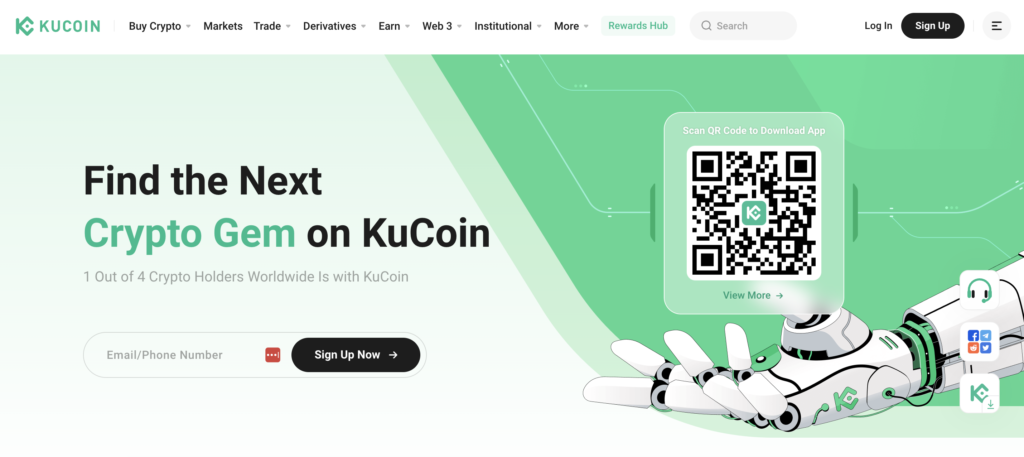This article provides a comprehensive analysis of the KuCoin Token (KCS) and its associated cryptocurrency. KuCoin Token, often abbreviated as KCS, is a significant player in the cryptocurrency space, known for its unique features and role within the KuCoin ecosystem. We will explore various aspects of the project, including its technological framework, tokenomics, ecosystem, growth prospects, and future development forecasts. This detailed examination aims to equip readers with a thorough understanding of KCS and its potential impact on the broader crypto market.

What is KuCoin Token (KCS)?
KuCoin Token (KCS) is the native cryptocurrency of the KuCoin exchange, one of the leading digital asset trading platforms globally. KCS serves multiple purposes within the KuCoin ecosystem, primarily designed to enhance the user experience on the platform. It offers various utilities, including reduced trading fees, staking opportunities, and participation in token sales on the KuCoin Spotlight. By leveraging the KCS token, KuCoin aims to incentivize user engagement, provide seamless trading experiences, and foster a vibrant community around its services. The core objective of KCS is to streamline operations within the KuCoin exchange, making it more efficient and user-friendly for its diverse user base.
History of KuCoin Token (KCS)
KuCoin Token (KCS) was launched in 2017, coinciding with the establishment of the KuCoin exchange. The project was founded by a group of blockchain enthusiasts and experienced business professionals with a vision to create a secure and straightforward cryptocurrency trading platform. Over the years, KuCoin has achieved several key milestones:
- 2017: Launch of the KuCoin exchange and the KCS token, providing users with the benefits of reduced trading fees and other platform-specific utilities.
- 2018: Introduction of KuCoin Shares (KCS) bonuses, allowing KCS holders to earn daily dividends from trading fees collected by the exchange.
- 2019: Expansion of KuCoin’s services to include KuCoin Futures, enabling users to trade cryptocurrency derivatives with leverage.
- 2020: Launch of the KuCoin Spotlight, a token launch platform designed to support innovative blockchain projects by offering them exposure and funding through token sales.
- 2021: Significant updates to the platform’s infrastructure, including enhanced security features and the implementation of advanced trading tools, solidifying KuCoin’s reputation as a reliable and user-centric exchange.
- 2022: Integration of decentralized finance (DeFi) services, expanding the utility of KCS within the broader DeFi ecosystem and increasing its adoption among users.
Through these milestones, KuCoin has established itself as a prominent player in the cryptocurrency exchange market, with KCS at the center of its ecosystem, driving growth and innovation.
How KuCoin Token (KCS) Works
KuCoin Token (KCS) operates on a multifaceted technological foundation designed to enhance the functionality and efficiency of the KuCoin exchange. KCS is an ERC-20 token built on the Ethereum blockchain, leveraging Ethereum’s robust security and widespread acceptance within the crypto ecosystem. The use of the ERC-20 standard ensures compatibility with a wide range of wallets and decentralized applications (dApps), facilitating seamless integration and usability.
Key Technologies
The KuCoin ecosystem is built upon several key technologies:
- KuCoin Shares (KCS) Bonuses: KCS holders receive daily dividends from the trading fees collected by the exchange. This feature incentivizes users to hold KCS and engage more actively with the platform.
- Trading Fee Discounts: Users who pay trading fees with KCS receive significant discounts, making trading more cost-effective.
- KuCoin Spotlight: A token launch platform that allows new projects to raise funds and gain visibility through token sales. This fosters innovation and provides opportunities for investors to support emerging technologies.
- KuCoin Futures: A platform for trading cryptocurrency derivatives with leverage, expanding the range of trading options available to users.
Blockchain and Consensus Mechanism
KuCoin itself is a centralized exchange, meaning it operates on a centralized architecture for transaction processing and management. However, the KCS token is based on the Ethereum blockchain, utilizing Ethereum’s Proof of Stake (PoS) consensus mechanism post-Ethereum 2.0 upgrade. PoS enhances scalability and reduces energy consumption compared to the previous Proof of Work (PoW) mechanism.
Technical Details
- ERC-20 Standard: KCS adheres to the ERC-20 token standard, ensuring it can interact seamlessly with other Ethereum-based protocols and services.
- Smart Contracts: Utilized for various functionalities within the KuCoin ecosystem, including automated distribution of KCS bonuses and facilitating token sales on KuCoin Spotlight.
- Security Features: Ethereum’s inherent security protocols are leveraged to ensure the integrity and safety of KCS transactions and smart contracts.
Differentiation from Other Projects
KuCoin differentiates itself from other cryptocurrency exchanges through its comprehensive suite of services and user-centric features:
- Comprehensive Ecosystem: Beyond simple trading, KuCoin offers a broad range of services, including futures trading, staking, and a launch platform for new tokens.
- User Incentives: The daily KCS bonuses and trading fee discounts provide continuous value to KCS holders, fostering a loyal and engaged user base.
- Advanced Trading Tools: KuCoin provides sophisticated trading tools and features, catering to both novice and experienced traders, enhancing the overall trading experience.
By integrating these technologies and features, KuCoin creates a robust and versatile trading environment, with KCS playing a pivotal role in driving user engagement and platform growth.
Tokenomics of KuCoin Token (KCS)
Is KCS a Token or a Coin?
KuCoin Token (KCS) is classified as a token, not a coin. This distinction arises because KCS is built on the Ethereum blockchain and follows the ERC-20 token standard. Unlike coins, which have their own native blockchains (e.g., Bitcoin, Ethereum), tokens operate on existing blockchains.
Emission Model
KCS has a capped supply of 200 million tokens, ensuring scarcity and potentially enhancing value over time. Initially, all tokens were pre-mined, meaning they were created and distributed to the market at launch without the need for mining processes.
Token Distribution
The distribution of KCS was strategically designed to ensure wide reach and utility:
- Founders and Team: A portion of the total supply was allocated to the founders and team members as an incentive for their contributions.
- Investors and Early Backers: Early investors received a significant portion during the initial coin offering (ICO), providing the necessary capital for platform development.
- Public Sale: The remaining tokens were made available to the public through various sales events.
Token Utility
KCS serves multiple functions within the KuCoin ecosystem:
- Trading Fee Discounts: Users who hold KCS can pay trading fees at a discounted rate, significantly reducing their transaction costs.
- Daily Bonuses: KCS holders receive a share of the daily trading fee revenue collected by the KuCoin exchange, distributed proportionally based on the amount of KCS held.
- Participation in Token Sales: KCS holders gain exclusive access to participate in new token sales on the KuCoin Spotlight platform.
- Staking: KCS can be staked to earn additional rewards, further incentivizing users to hold and utilize the token within the ecosystem.
Price and Market Performance
The price of KCS is influenced by multiple factors, including market demand, overall cryptocurrency market trends, and the performance of the KuCoin exchange. The token’s value has experienced fluctuations, reflecting broader market dynamics and the evolving utility of KCS within the KuCoin platform.
Burn Mechanism
To enhance the value of KCS and manage supply, KuCoin implements a token burn mechanism. Periodically, a portion of the total supply of KCS is bought back from the market and permanently removed from circulation. This deflationary tactic reduces the overall supply, potentially increasing the value of the remaining tokens.
Where to Buy KCS
KuCoin Token (KCS) can be purchased on several major cryptocurrency exchanges, offering users various options to acquire the token. The following exchanges are some of the primary platforms where KCS is traded:
- KuCoin: As the native exchange for KCS, KuCoin offers the most comprehensive trading pairs and highest liquidity for the token. Users can buy KCS directly using various cryptocurrencies and fiat currencies.
- Binance: Binance, one of the largest cryptocurrency exchanges globally, lists KCS, providing significant liquidity and multiple trading pairs.
- MEXC: This exchange lists KCS with various trading pairs, facilitating easy purchase and trade of the token.
- Bybit: Bybit also supports trading for KCS, providing another reliable platform for acquiring the token.
These exchanges provide users with diverse options to buy KCS, catering to different preferences and requirements.
Where to Store KuCoin Token (KCS)
Storing KuCoin Token (KCS) securely is crucial for ensuring its safety and accessibility. Here are some recommended wallets for storing KCS:
- KuCoin Wallet: The official KuCoin Wallet offers integrated support for KCS, providing a seamless and secure storage solution directly linked to the KuCoin exchange.
- MetaMask: As a widely used Ethereum wallet, MetaMask supports all ERC-20 tokens, including KCS. It offers a user-friendly interface and robust security features.
- Trust Wallet: Another popular mobile wallet that supports ERC-20 tokens, Trust Wallet allows users to store KCS securely on their mobile devices.
- Ledger Nano S/X: These hardware wallets offer top-tier security for storing KCS offline, protecting it from potential online threats.
- MyEtherWallet (MEW): An online wallet service that supports all ERC-20 tokens, MEW allows users to manage their KCS holdings with ease.
These wallets offer varying levels of security and convenience, allowing users to choose the best option based on their storage needs and preferences.
Project Prospects for KuCoin Token (KCS)
Basis for Growth
The growth of the KuCoin Token (KCS) project is underpinned by several strategic factors. One primary driver is the continuous expansion and innovation of the KuCoin exchange platform. As KuCoin enhances its trading services, introduces new features, and expands its user base, the utility and demand for KCS naturally increase. Additionally, the tokenomics of KCS, including the token burn mechanism, creates a deflationary effect that can drive value appreciation over time.
Clients and Partners
KuCoin has cultivated a diverse client base that includes individual traders, institutional investors, and crypto enthusiasts. Its user-friendly interface and wide range of supported assets attract both novice and experienced traders. Key partners of KuCoin and the KCS ecosystem include:
- Chainalysis: Partnering for enhanced security and compliance.
- Onchain Custodian: Providing secure asset custody solutions.
- Banxa: Facilitating fiat-to-crypto transactions, enhancing accessibility for users.
- Simplex: Enabling easy crypto purchases with credit cards.
These partnerships strengthen KuCoin’s infrastructure and expand its service offerings, contributing to the overall growth and stability of the project.
Development Forecast
The future development of KCS looks promising, driven by KuCoin’s commitment to continuous improvement and innovation. The exchange’s strategic initiatives, such as expanding its DeFi offerings and integrating with more decentralized applications, are likely to enhance the utility of KCS further. Additionally, KuCoin’s focus on global expansion and regulatory compliance positions it well to attract a broader user base and increase market penetration.
Project Ecosystem
The KuCoin ecosystem is extensive, encompassing a range of services and platforms that synergize to enhance the user experience. Key components of the ecosystem include:
- KuCoin Exchange: The central platform for trading a wide variety of cryptocurrencies.
- KuCoin Futures: Offering leveraged trading for advanced traders.
- KuCoin Spotlight: A token launch platform that supports new blockchain projects.
- KuCoin Labs: An investment and research arm that incubates and supports innovative blockchain projects.
- KuCoin Community Chain (KCC): A public blockchain initiative aimed at providing faster and lower-cost transactions, enhancing the overall efficiency of the ecosystem.
This diverse ecosystem provides multiple avenues for users to engage with the platform, increasing the overall value proposition of holding and using KCS. The integrated services within the KuCoin ecosystem create a comprehensive and cohesive environment for trading, investing, and participating in the broader blockchain space.
Conclusion
In conclusion, KuCoin Token (KCS) represents a vital component of the KuCoin ecosystem, offering unique benefits and utility to its users. The intricate technological design, robust tokenomics, and expansive ecosystem position KCS as a noteworthy cryptocurrency with substantial growth potential. As the crypto market evolves, KCS’s strategic developments and future innovations will likely play a crucial role in shaping its trajectory and influence within the industry.






